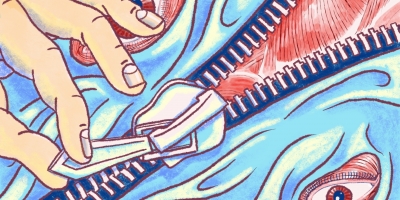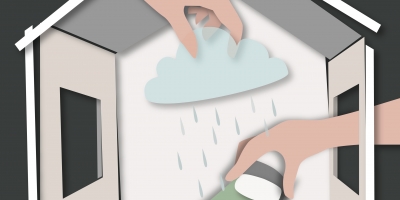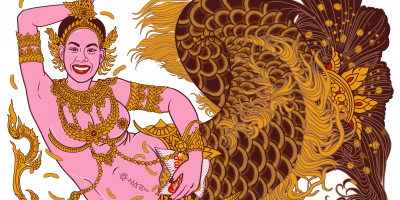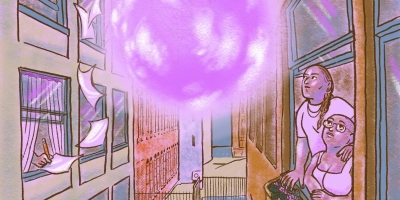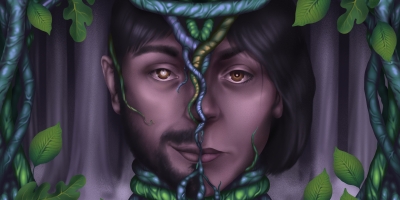Issue 19
Letter from the Editor
by Rebecca Rubenstein
Hello,
Earlier this year, I finally gathered myself to watch the miniseries adaptation of Emily St. John Mandel’s Station Eleven. Though I’d been hyped when it was first announced years ago and planned to watch it when it premiered last December, when the time came I found myself hesitating. Throughout the pandemic, I’ve found it immensely difficult to engage with media that is hard-going and even more difficult to engage with narratives that traffic in apocalyptic scenarios, the end of the world, and, of course, global pandemics. If you’ve ever read Station Eleven—which, if not, I’d highly recommend—you know the novel is steeped in all of these things. But unlike many of its other grim predecessors, it is also steeped in a celebration of humanity and hope. Back when I sold books and it was time to write a shelf-talker for it, I called it “the most humane book about the apocalypse I have ever read,” and this, perhaps, had more to do with my hesitation around watching the adaptation than anything. Was I ready to immerse myself in something that would so sincerely squeeze my heart? 2021 was a year when my heart got squeezed and squeezed and squeezed—so many of our hearts did—and I just didn’t know if I could take it. Film has always been the one medium that could leave me emotionally decimated. I have often sat in the dark of theaters while the credits rolled and needed to remind myself that what I just witnessed did not actually happen and especially not to me. The viscera wasn’t real. I had just been enveloped by someone else’s story, that’s all, most of it mere fiction.
The TV adaptation of Station Eleven diverges in many ways from its literary source, combining and inventing characters, playing with narrative timelines, and even changing the original setting from Toronto to Chicago (a detail I appreciated but, because I’m from the latter, meant the devastation depicted also left me feeling absolutely gutted). Despite this, I found it to be a marvel, one of the best adaptations of a book I’d ever seen, because there’s one crucial way in which it doesn’t diverge: in its tone and tenor. The novel has an incredibly specific tone, one that is able to capture the terror, grief, sadness, and cynicism of what it means to survive a mass death event—or, depending on where we are in the book, know the odds are slim that you will—but also a tone that is able to capture the enduring hope that humans seem to have in the face of abject horror. Both the novel and its adaptation aren’t hokey about their approaches to this hopefulness, either; they aren’t disingenuous. The characters know what’s on the line—even after the virus has passed, they know the future is grave and uncertain. But still. And yet. There is this sense to keep going. There is this sense to keep pressing on despite the persistent danger of their fellow humans. There is this sense to find meaning in the chaos that has been wrought, to know that human connectivity and love and joy are still possible.
I have spent the past few months thinking deeply about all of this, about the idea of pressing forward in the face of unrelenting chaos and uncertainty. I don’t know if things will ever stabilize again. I don’t know if that’s possible in this country in particular, in my lifetime. We have seen so much suffering here—and not just in the past few years, but decades upon decades, since this country’s colonialist inception—to the point where I have no good way of pointing to a future where human rights in the U.S. aren’t constantly being eroded or threatened with erosion. I want to believe, but belief is not the same as reality. But still. And yet. Art exists. Our words exist. Our imaginations are still functional. We are still tapping into the deepest part of ourselves, writing it all down, illustrating it, sharing it with others. One of my favorite parts of Station Eleven is the existence of The Museum of Civilization, an aviation tower control room full of objects that have been salvaged from life before the pandemic and left on display. It’s a way for the characters who visit the Museum to remember—to tie themselves back to their shared humanity. To feel hope. And I have been thinking about this museum, and about museums in general, and about archives, and about collections, and how we’re still threading the past with the present, we’re still preserving, we’re still creating a map of our humanity through these shared spaces we create.
The internet might one day blink into nothingness, but for now, a literary magazine feels like its own Museum of Civilization: it’s a way to preserve our imaginations. We are making a record. In this way, Issue 19 is an echo of what we’re thinking about now, of so many questions we have and the ways in which we can navigate those questions. It’s an issue full of family and the stories we tell, grief and loss, religion and desire, our bodies and autonomy, our agency and choice, the precision of language and detail, and above all, the elasticity of imagination. As always, I hope you find something in these pages that moves you, that makes you remember why you are still alive, that makes you smile, that blows your mind and makes you think about things in a completely different way. But most of all, I hope you feel momentum. I hope you get the sense that we are pressing forward, we are pressing forward, we are pressing forward.
Rebecca Rubenstein
Editor-in-Chief, Midnight Breakfast

